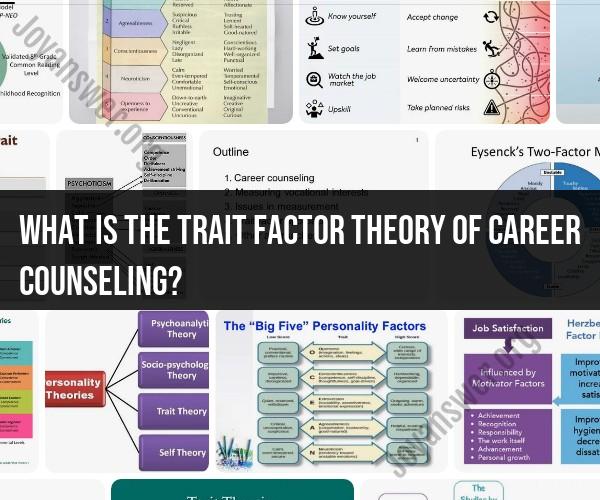What is the trait factor theory of career counseling?
The Trait-Factor Theory, also known as the Trait-and-Factor Theory, is a well-established approach in career counseling and vocational psychology. Developed by Frank Parsons in the early 20th century, this theory provides a structured framework for helping individuals make informed career choices by matching their traits (attributes, abilities, interests, values) with the factors (occupational requirements, job opportunities, educational paths) associated with various careers. Here's an explanation of the key concepts and principles of the Trait-Factor Theory:
1. Matching Theory:
- The core principle of the Trait-Factor Theory is that individuals are more likely to be satisfied and successful in their careers when there is a good match between their personal traits and the factors associated with a particular occupation.
2. Three Essential Elements:
- This theory emphasizes three essential elements in career decision-making:
- Understanding of Self: Individuals must have a clear understanding of their own traits, which include abilities, interests, values, personality, and aptitudes.
- Knowledge of the World of Work: Individuals need accurate and up-to-date information about various careers, including occupational requirements, job opportunities, and job market trends.
- The Ability to Make Rational Choices: Armed with self-knowledge and information about the world of work, individuals can make rational career choices that align with their traits and the demands of specific careers.
3. The Process of Career Counseling:
- Career counselors following the Trait-Factor Theory guide individuals through a structured process that includes self-assessment, career exploration, and decision-making. This process is often referred to as "The Three-Step Process."
- Step 1: Self-Assessment: Individuals are encouraged to evaluate their own traits, strengths, weaknesses, interests, and values. This often involves taking assessments and tests to gain a better understanding of themselves.
- Step 2: Occupational Research: Individuals research different careers, exploring factors such as job requirements, salary expectations, job growth, and educational pathways. Career counselors may provide resources and guidance for this research.
- Step 3: Decision-Making: With a clearer understanding of self and the world of work, individuals make career decisions that align with their traits. This may involve setting short-term and long-term goals and creating action plans.
4. Realistic Career Planning:
- Parsons stressed the importance of setting realistic career goals based on an individual's abilities and interests. He believed that individuals should pursue careers that match their abilities to avoid disappointment and dissatisfaction.
5. Ongoing Career Development:
- Career development is viewed as an ongoing process rather than a one-time decision. Individuals are encouraged to continuously reassess their traits, consider new opportunities, and adapt to changes in the job market.
6. Practical Application:
- The Trait-Factor Theory has been widely used in career counseling and vocational guidance programs, especially in educational settings. It has influenced the development of career assessment tools and counseling approaches.
While the Trait-Factor Theory provides a structured and systematic approach to career counseling, it is important to note that contemporary career counseling theories and approaches have evolved beyond this model. Many newer theories consider additional factors, such as the role of personality, social influences, and life roles, in career decision-making. However, the Trait-Factor Theory remains a valuable foundation for understanding the basics of career counseling and helping individuals make informed career choices.
Trait-Factor Theory of Career Counseling: Key Concepts
Trait-factor theory is a theory of career counseling that focuses on matching individuals' traits and characteristics with the requirements of different occupations. The theory is based on the assumption that people are more likely to be successful and satisfied in their careers if they are employed in occupations that are a good fit for their traits and characteristics.
Some of the key concepts of trait-factor theory include:
- Traits: Traits are enduring personal characteristics that are relatively stable over time. Some common traits that are considered in trait-factor theory include interests, abilities, values, and personality.
- Factors: Factors are characteristics of occupations that are important for success. Some common factors that are considered in trait-factor theory include skills, knowledge, and abilities required for the job.
- Matching: Matching is the process of finding occupations that are a good fit for an individual's traits and characteristics. This can be done through a variety of methods, such as career assessments, personality tests, and interviews.
Career Counseling and Trait-Factor Theory: Insights and Application
Trait-factor theory can be used to provide insights and guidance to individuals at all stages of their careers. For example, it can be used to help individuals:
- Identify their interests, abilities, values, and personality type.
- Explore different career options.
- Make informed decisions about their careers.
- Develop a career plan.
Trait-factor theory is also used by career counselors to help their clients find jobs and careers that are a good fit for them. Career counselors can use a variety of tools and resources to assess their clients' traits and characteristics and to match them with suitable occupations.
Career Guidance and the Trait-Factor Approach
The trait-factor approach to career guidance is based on the assumption that people are more likely to be successful and satisfied in their careers if they are employed in occupations that are a good fit for their traits and characteristics. Career counselors who use this approach focus on helping their clients to identify their traits and characteristics and to match them with suitable occupations.
Career guidance using the trait-factor approach typically involves the following steps:
- Assessment: The career counselor assesses the client's traits and characteristics using a variety of tools and resources, such as career assessments, personality tests, and interviews.
- Matching: The career counselor matches the client's traits and characteristics with suitable occupations.
- Planning: The career counselor helps the client to develop a career plan. This plan may include specific steps that the client can take to achieve their career goals.
The trait-factor approach to career guidance is a well-established and widely used approach. It is an effective approach for helping individuals to find careers that are a good fit for their traits and characteristics.
Here are some examples of how the trait-factor approach to career guidance can be used:
- A career counselor can use a career assessment to help a client identify their interests, abilities, values, and personality type. This information can then be used to match the client with suitable occupations.
- A career counselor can use a personality test to help a client identify their strengths and weaknesses. This information can then be used to match the client with occupations that are a good fit for their personality type.
- A career counselor can use interviews to learn more about the client's career goals and to assess their skills and experience. This information can then be used to match the client with suitable occupations.
If you are interested in learning more about the trait-factor approach to career guidance, I encourage you to speak with a career counselor.











